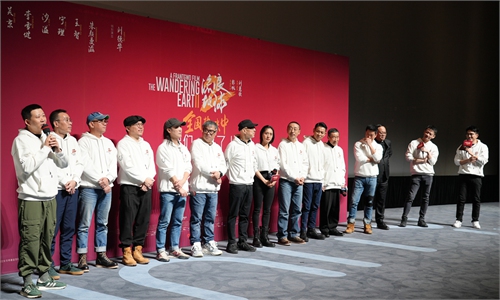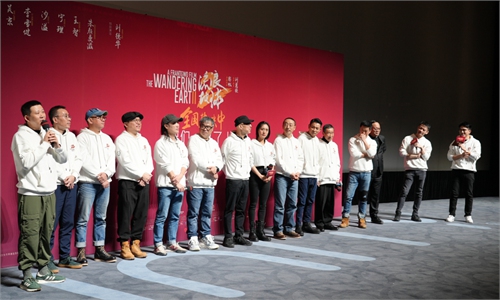ARTS / CULTURE & LEISURE
Director Guo Fan of the 'Wandering Earth' series sees China's national culture as connecting world audiences
Debuting on the global stage

Director Guo Fan Photo: VCG
Domestic sci-fi blockbuster The Wandering Earth II has performed well at the Chinese mainland box office, earning 3.67 billion yuan ($537.53 million) as of Monday, according to Chinese ticketing platform Maoyan. The film is also expanding its reach overseas, where it has already hit theaters in North America, the UK, New Zealand and Australia. The film is scheduled to debut in South Africa in March and Russia in April.This sci-fi prequel is one of the rare Chinese films to have such a large international release, but compared with Hollywood that sometimes adds extra plots catering to local markets, the film's director, Guo Fan, chose not to alter his film since, as he told the Global Times, that he "always felt that the national culture [of China], by its nature, belongs to the entire world, so there was no need for special interpretation."
Adapting to markets
According to American website Box Office Mojo, The Wandering Earth II at one time ranked the No.10 on North America's weekend box-office chart in late January. It has earned over $4 million so far in the region.
Guo said that after chatting with some foreign friends and moviegoers overseas and watching some online reviews about the film from overseas audiences, he found that foreign moviegoers were able to understand the movie quite well and some were moved to tears during certain touching moments just like Chinese audiences.
"The film tells a story about the unity of all mankind, and has been well-accepted by everyone. The problem is distribution," he said.
According to Guo, Chinese studios need to keep in mind the culture of these countries as well as audiences' movie-watching habits. For example, US audiences do not like to watch subtitles, so studios in China may have to consider producing fully English dubbed versions. This is also why the poster and trailer for the film in North America were also different from what they released in Europe and Africa.
When filming The Wandering Earth (2019), Guo recalled they had a hard time as they even did not know how to make a space suit. When it came to The Wandering Earth II, the production crew was very proud of themselves as they were able to complete the stage sets and props such as guns, diving suits and space suits by themselves.
Guo said it was all about innovation and integration. Through high technology such as 3D printing, computer numerical control lathes and laser engraving, they produced props in the same way that industrial factories produce parts and components. In this way, props could be produced in batches and sets could be assembled through modular combination.
"Thanks to our country's solid high-tech productivity, we became highly efficient when producing props. So my personal feeling is that compared with Hollywood, we are on an 'overtaking curve' and we can basically reach their top level," said Guo.
He said the entire production process in Hollywood is gradually transforming from traditional production thinking to the current high-tech thinking of production accompanied by industrial improvement, as China is now enjoying the fruits of industrialization. This "overtaking curve" comes from the constant iteration of China's technological development.

Promotional material for The Wandering Earth II Photo: Courtesy of Maoyan
Planting a seedAccording to Guo, 70 percent of the props that moviegoers saw were real, leaving only 30 percent up to CGI, and that's why so many moviegoers have commented that the film felt "so real."
The film was also completed with the strong support of China's leading industries like the construction machinery industry. For instance, the Xuzhou Construction Machinery Group Co, Ltd provided the vehicles that contributed to the "visual feast" seen in the film.
And this is not a one-way street; the production crew also expects that the Chinese industry sector will get some inspiration from the future technology on display in the film.
"I think this is a type of mutual promotion. Maybe our [props] can actually be used in real equipment, including military equipment, aircraft, drones and the J-20 stealth fighter jet."
Another reason why the film is significant comes down to how it stimulates children's imagination. Guo recalled that he was very impressed when a teen said he watched the first film in elementary school, and the second while in middle school. These viewings have inspired him to go into the aerospace industry.
"If this child really becomes an astronaut or an aerospace worker one day, we will be even prouder to have made such a film. I think it is very important to plant seeds in children because the future will be created by this young generation."
Guo said that Chinese sci-fi films will continue to improve, adding that he was very pleased to see the return of Chinese moviegoers to theaters during the Spring Festival holidays.
"Chinese people still like watching films, and as long as they are there, I feel motivated to keep moving forward."




